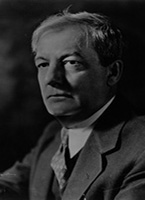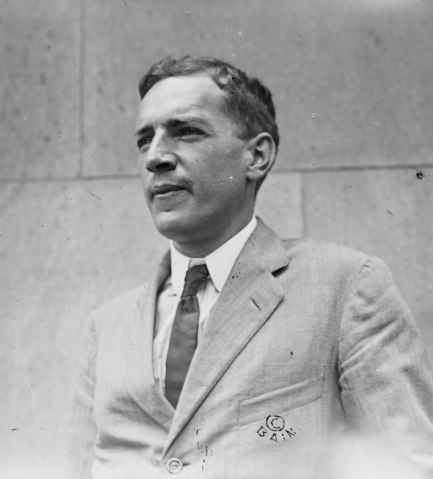
Martha C. Nussbaum
Born: New York, New York May 6, 1947
Connection to Illinois: Nussbaum is the Ernst Freund Distinguished Service Professor of Law and Ethics, appointed in the Philosophy Department and the Law School of the University of Chicago. Biography: Martha C. Nussbaum gave the 2016 Jefferson Lecture for the National Endowment for the Humanities and has received honorary degrees from sixty-four colleges and universities in the US, Canada, Latin America, Asia, Africa, and Europe. Among her awards are the 2016 Kyoto Prize in Arts and Philosophy, the 2018 Berggruen Prize in Philosophy and Culture, and the 2020 Holberg Prize. These three prizes are regarded as the most prestigious awards available in fields not eligible for a Nobel. She has written more than twenty-two books.
Awards:
- Justice for Animals: Our Collective Responsibility Starred Review - Publishers Weekly
- The Cosmopolitan Tradition Berggruen Prize
- Citadels of Pride: Sexual Abuse, Accountability, and Reconciliation Finalist, Silver Gavel Award, American Bar Association, 2022
Web: https://www.britannica.com/biography/Martha-Nussbaum
Web: https://www.neh.gov/about/awards/jefferson-lecture/martha-nussbaum-biography
Wikipedia: https://en.wikipedia.org/wiki/Martha_Nussbaum
WorldCat: http://www.worldcat.org/search?q=Martha++C.++Nussbaum
Selected Titles
 |
Citadels of Pride: Sexual Abuse, Accountability, and Reconciliation ISBN: 1324004118 OCLC: 1236897261 Norton 2021 In this essential philosophical and practical reckoning, Martha C. Nussbaum, renowned for her eloquence and clarity of moral vision, shows how sexual abuse and harassment derive from using people as things to one’s own benefit―like other forms of exploitation, they are rooted in the ugly emotion of pride. She exposes three “Citadels of Pride” and the men who hoard power at the apex of each. In the judiciary, the arts, and sports, Nussbaum analyzes how pride perpetuates systemic sexual abuse, narcissism, and toxic masculinity. The courage of many has brought about some reforms, but justice is still elusive―warped sometimes by money, power, or inertia; sometimes by a collective desire for revenge. By analyzing the effects of law and public policy on our ever-evolving definitions of sexual violence, Nussbaum clarifies how gaps in U.S. law allow this violence to proliferate; why criminal laws dealing with sexual assault and Title VII, the federal law that is the basis for sexual harassment doctrine, need to be complemented by an understanding of the distorted emotions that breed abuse; and why anger and vengeance rarely achieve lasting change. Citadels of Pride offers a damning indictment of the culture of male power that insulates high-profile abusers from accountability. Yet Nussbaum offers a hopeful way forward, envisioning a future in which, as survivors mobilize to tell their stories and institutions pursue fair and nuanced reform, we might fully recognize the equal dignity of all people. |
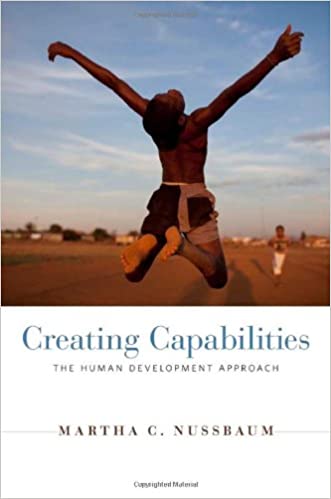 |
Creating Capabilities: The Human Development Approach ISBN: 0674050541 OCLC: 753976782 Belknap Press 2011 If a country’s Gross Domestic Product increases each year, but so does the percentage of its people deprived of basic education, health care, and other opportunities, is that country really making progress? If we rely on conventional economic indicators, can we ever grasp how the world’s billions of individuals are really managing? |
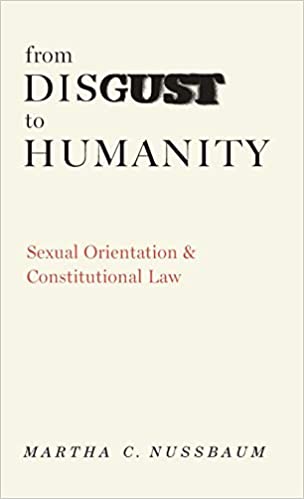 |
From Disgust to Humanity: Sexual Orientation and Constitutional Law (Inalienable Rights Series) ISBN: 0195305310 OCLC: 426812934 Oxford University Press Oxford ; 2010 A distinguished professor of law and philosophy at the University of Chicago, a prolific writer and award-winning thinker, Martha Nussbaum stands as one of our foremost authorities on law, justice, freedom, morality, and emotion. In From Disgust to Humanity, Nussbaum aims her considerable intellectual firepower at the bulwark of opposition to gay equality: the politics of disgust. |
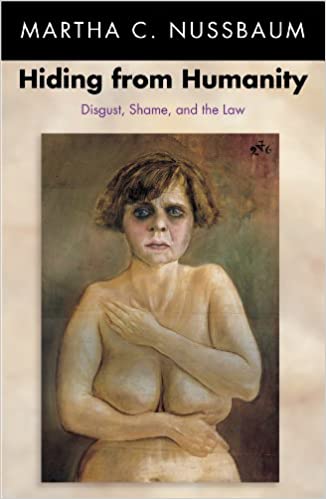 |
Hiding from Humanity ISBN: 0691095264 OCLC: 437140487 Princeton University Press Princeton : 1994 Should laws about sex and pornography be based on social conventions about what is disgusting? Should felons be required to display bumper stickers or wear T-shirts that announce their crimes? This powerful and elegantly written book, by one of America's most influential philosophers, presents a critique of the role that shame and disgust play in our individual and social lives and, in particular, in the law. Martha Nussbaum argues that we should be wary of these emotions because they are associated in troubling ways with a desire to hide from our humanity, embodying an unrealistic and sometimes pathological wish to be invulnerable. Nussbaum argues that the thought-content of disgust embodies "magical ideas of contamination, and impossible aspirations to purity that are just not in line with human life as we know it." She argues that disgust should never be the basis for criminalizing an act or play either the aggravating or the mitigating role in criminal law it currently does. She writes that we should be similarly suspicious of what she calls "primitive shame," a shame "at the very fact of human imperfection," and she is harshly critical of the role that such shame plays in certain punishments. Drawing on an extraordinarily rich variety of philosophical, psychological, and historical references--from Aristotle and Freud to Nazi ideas about purity--and on legal examples as diverse as the trials of Oscar Wilde and the Martha Stewart insider trading case, this is a major work of legal and moral philosophy. |
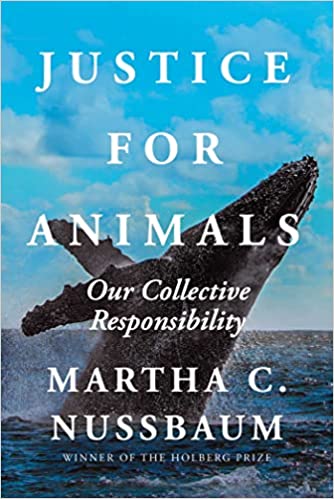 |
Justice for Animals: Our Collective Responsibility ISBN: 1982102500 OCLC: 1350637292 Simon & Schuster 2023 Animals are in trouble all over the world. Whether through the cruelties of the factory meat industry, poaching and game hunting, habitat destruction, or neglect of the companion animals that people purport to love, animals suffer injustice and horrors at our hands every day. The world needs an ethical awakening, a consciousness-raising movement of international proportions. In Justice for Animals, one of the world’s most influential philosophers and humanists Martha C. Nussbaum provides a revolutionary approach to animal rights, ethics, and law. From dolphins to crows, elephants to octopuses, Nussbaum examines the entire animal kingdom, showcasing the lives of animals with wonder, awe, and compassion to understand how we can create a world in which human beings are truly friends of animals, not exploiters or users. All animals should have a shot at flourishing in their own way. Humans have a collective duty to face and solve animal harm. An urgent call to action and a manual for change, Nussbaum’s groundbreaking theory directs politics and law to help us meet our ethical responsibilities as no book has done before. |
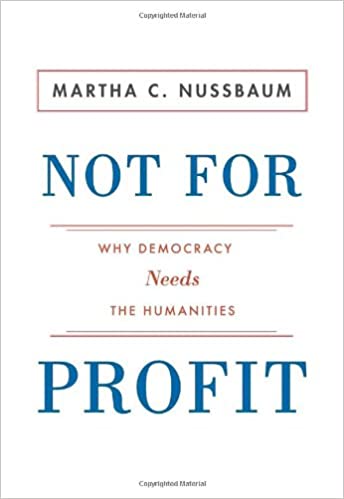 |
Not for Profit: Why Democracy Needs the Humanities ISBN: 0691140642 OCLC: 466341394 Princeton University Press Princeton, N.J. : 2010 In this short and powerful book, celebrated philosopher Martha Nussbaum makes a passionate case for the importance of the liberal arts at all levels of education. Historically, the humanities have been central to education because they have rightly been seen as essential for creating competent democratic citizens. But recently, Nussbaum argues, thinking about the aims of education has gone disturbingly awry both in the United States and abroad. Anxiously focused on national economic growth, we increasingly treat education as though its primary goal were to teach students to be economically productive rather than to think critically and become knowledgeable and empathetic citizens. This shortsighted focus on profitable skills has eroded our ability to criticize authority, reduced our sympathy with the marginalized and different, and damaged our competence to deal with complex global problems. And the loss of these basic capacities jeopardizes the health of democracies and the hope of a decent world. In response to this dire situation, Nussbaum argues that we must resist efforts to reduce education to a tool of the gross national product. Rather, we must work to reconnect education to the humanities in order to give students the capacity to be true democratic citizens of their countries and the world. Drawing on the stories of troubling―and hopeful―educational developments from around the world, Nussbaum offers a manifesto that should be a rallying cry for anyone who cares about the deepest purposes of education. |
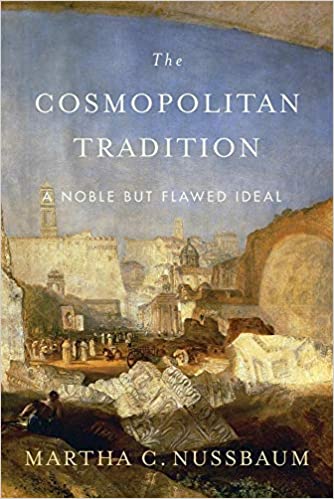 |
The Cosmopolitan Tradition: A Noble but Flawed Ideal ISBN: 0674052498 OCLC: 1107305723 Belknap Press 2019 The cosmopolitan political tradition in Western thought begins with the Greek Cynic Diogenes, who, when asked where he came from, responded that he was a citizen of the world. Rather than declaring his lineage, city, social class, or gender, he defined himself as a human being, implicitly asserting the equal worth of all human beings. Nussbaum pursues this “noble but flawed” vision of world citizenship as it finds expression in figures of Greco-Roman antiquity, Hugo Grotius in the seventeenth century, Adam Smith during the eighteenth century, and various contemporary thinkers. She confronts its inherent tensions: the ideal suggests that moral personality is complete, and completely beautiful, without any external aids, while reality insists that basic material needs must be met if people are to realize fully their inherent dignity. Given the global prevalence of material want, the lesser social opportunities of people with physical and cognitive disabilities, the conflicting beliefs of a pluralistic society, and the challenge of mass migration and asylum seekers, what political principles should we endorse? Nussbaum brings her version of the Capabilities Approach to these problems, and she goes further: she takes on the challenge of recognizing the moral claims of nonhuman animals and the natural world. The insight that politics ought to treat human beings both as equal to each other and as having a worth beyond price is responsible for much that is fine in the modern Western political imagination. The Cosmopolitan Tradition extends Nussbaum’s work, urging us to focus on the humanity we share rather than all that divides us. |
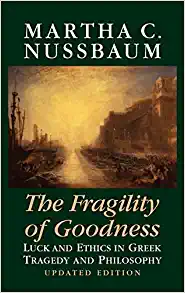 |
The Fragility of Goodness ISBN: 052179126X OCLC: 44727859 Cambridge University Press 1986 This book is a study of ancient views about "moral luck." It examines the fundamental ethical problem that many of the valued constituents of a well-lived life are vulnerable to factors outside a person's control, and asks how this affects our appraisal of persons and their lives. The Greeks made a profound contribution to these questions, yet neither the problems nor the Greek views of them have received the attention they deserve. This updated edition contains a new preface. |
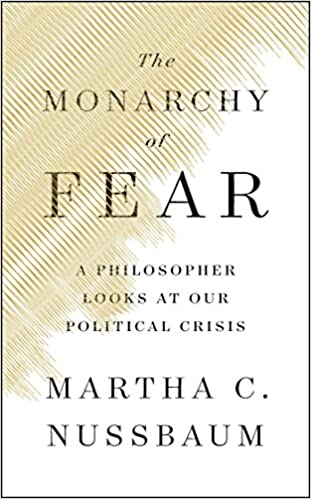 |
The Monarchy of Fear: A Philosopher Looks at Our Political Crisis ISBN: 1501172492 OCLC: 989964017 Simon & Schuster 2018 For decades Martha C. Nussbaum has been an acclaimed scholar and humanist, earning dozens of honors for her books and essays. In The Monarchy of Fear she turns her attention to the current political crisis that has polarized American since the 2016 election. Although today’s atmosphere is marked by partisanship, divisive rhetoric, and the inability of two halves of the country to communicate with one another, Nussbaum focuses on what so many pollsters and pundits have overlooked. She sees a simple truth at the heart of the problem: the political is always emotional. Globalization has produced feelings of powerlessness in millions of people in the West. That sense of powerlessness bubbles into resentment and blame. Blame of immigrants. Blame of Muslims. Blame of other races. Blame of cultural elites. While this politics of blame is exemplified by the election of Donald Trump and the vote for Brexit, Nussbaum argues it can be found on all sides of the political spectrum, left or right. Drawing on a mix of historical and contemporary examples, from classical Athens to the musical Hamilton, The Monarchy of Fear untangles this web of feelings and provides a roadmap of where to go next. |
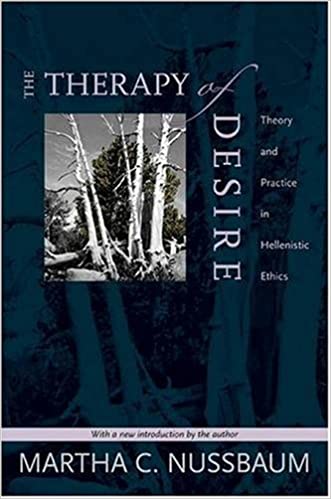 |
The Therapy of Desire: Theory and Practice in Hellenistic Ethics ISBN: 0691033420 OCLC: 28724422 Princeton University Press Princeton, N.J. : 1994 The Epicureans, Skeptics, and Stoics practiced philosophy not as a detached intellectual discipline, but as a worldly art of grappling with issues of daily and urgent human significance: the fear of death, love and sexuality, anger and aggression. Like medicine, philosophy to them was a rigorous science aimed both at understanding and at producing the flourishing of human life. In this engaging book, Martha Nussbaum examines texts of philosophers committed to a therapeutic paradigm--including Epicurus, Lucretius, Sextus Empiricus, Chrysippus, and Seneca--and recovers a valuable source for our moral and political thought of today. |
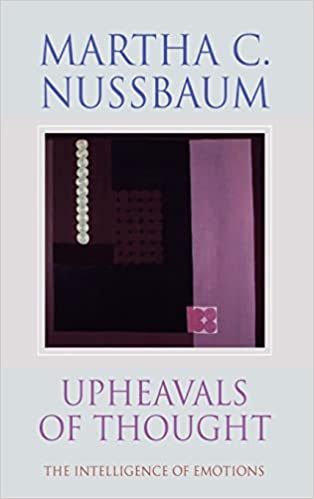 |
Upheavals of Thought: The Intelligence of Emotions ISBN: 0521462029 OCLC: 45757787 Cambridge University Press Cambridge ; 2001 What is it to grieve for the death of a parent? More literary and experiential than other philosopical works on emotion, Upheavals of Thought will engage the reader who has ever stopped to ask that question. Emotions such as grief, fear, anger and love seem to be alien forces that disturb our thoughts and plans. Yet they also embody some of our deepest thoughts--about the importance of the people we love, about the vulnerability of our bodies and our plans to events beyond our control. In this wide-ranging book, based on her Gifford Lectures, philosopher Martha Nussbaum draws on philosophy, psychology, anthropology, music and literature to illuminate the role emotions play in our thoughts about important goals. Starting with an account of her own mother's death, she argues that emotions are intelligent appraisals of a world that we do not control, in the light of our own most significant goals and plans. She then investigates the implications of this idea for normative issues, analyzing the role of compassion in private and public reasoning and the attempts of authors both philosophical and literary to purify or reform the emotion of erotic love. Ultimately, she illuminates the structure of emotions and argues that once we understand the complex intelligence of emotions we will also have new reasons to value works of literature as sources of ethical education. Martha C. Nussbaum is Ernst Freund Distinguished Service Professor of Law and Ethics, University of Chicago, appointed in Law School, Philosophy department, and Divinity School, and an Associate in Classics. A leading scholar in ancient Greek ethics, aesthetics and literature, her previous books include The Fragility of Goodness (Cambridge, 1986), Loves's Knowledge (Oxford, 1992), Poetic Justice (Beacon Press, 1997), The Therapy of Desire (Princeton, 1996), Cultivating Humanity (Harvard, 1997), and Sex and Social Justice (Oxford, 1999). Her reviews have appeared in the New York Times, Boston Globe, New York Review of Books, and New Republic. |



